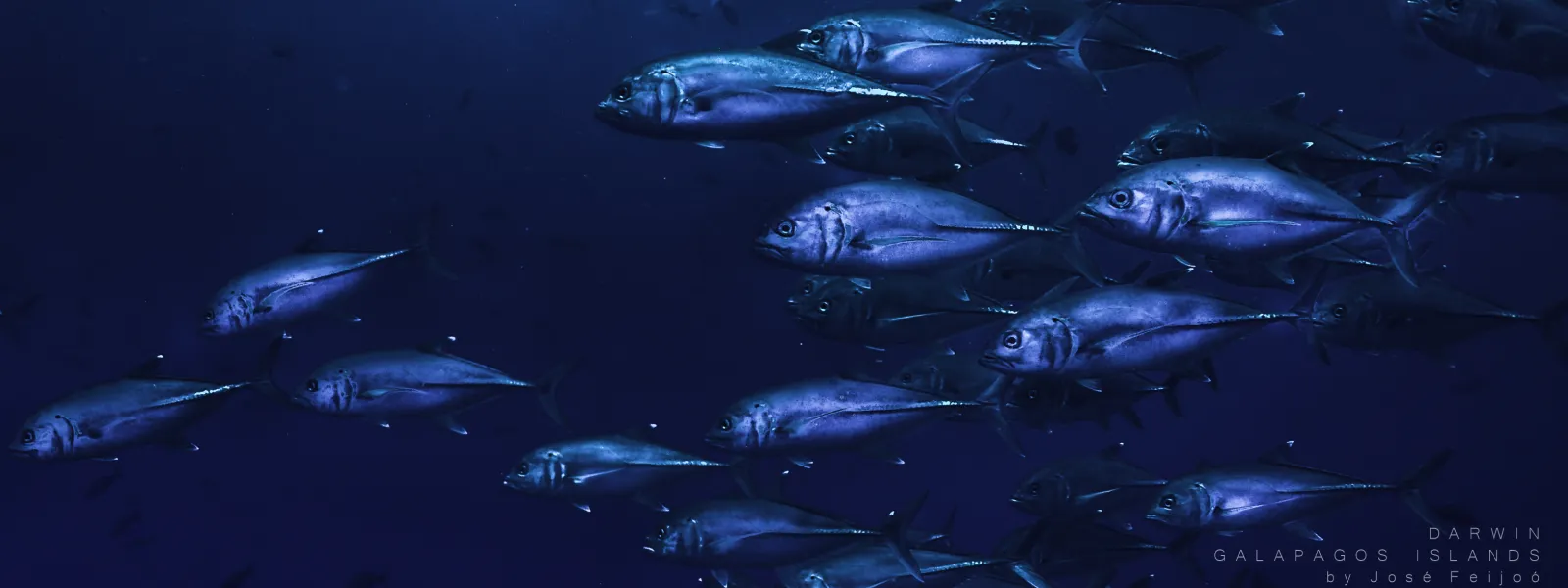
Publications
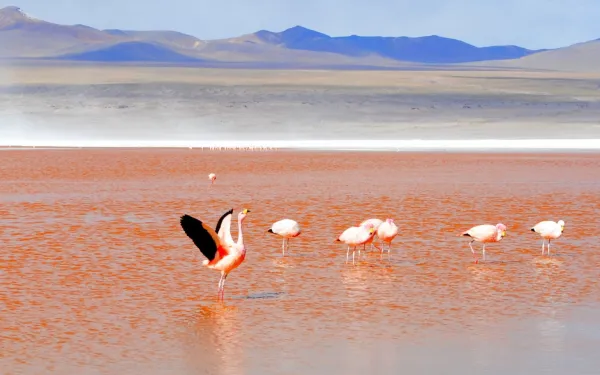
Justice for Andean Wetlands and Indigenous Peoples in Climate Action
The growing global demand for transition minerals—including lithium, copper, and nickel—driven by the current energy transition model, but also by the expansion of the digital economy, data infrastructure, and the military and aerospace industries, is causing irreversible ecological damage and violating fundamental human rights across the territories of the Global South. Latin America is the most biodiverse region on the planet and one of the most culturally diverse regions in the world. It is home to numerous Indigenous peoples who inhabit and safeguard these territories.At the same time, the region holds significant mineral deposits, placing it at the center of the growing global interest in mineral extraction. This demand intersects with fragile ecosystems, unique biodiversity and the territories of traditional and Indigenous communities, including the Amazon and the high Andean wetlands, which are crucial for climate adaptation due to their role in water regulation, and in mitigation, as they act as carbon sinks.Intensive mining in these ecosystems exacerbates climate vulnerability and fosters socio-environmental conflicts, compromising the ecological and cultural integrity of these ecosystems and communities. The push to expand extraction contradicts multilateral environmental protection frameworks and the climate and biodiversity commitments adopted by the States Parties. This trend jeopardizes the possibility of a just and equitable transition, reproducing the same patterns of inequality and climate harm that current policies claim to overcome. In this context, the Alliance for Andean Wetlands calls on States Parties to the UNFCCC to ensure: 1. Human rights and justice must be at the center of any transition and of all strategies for climate change adaptation and mitigation, including the rights of communities living in territories where the transition minerals are located.Human rights are essential to ensuring a just, equitable and people-centred process. States must guarantee the right to self-determination of Indigenous peoples, recognized worldwide as guardians of natural systems. This must encompass their right to define their own development priorities and to exercise Free, Prior and Informed Consent (FPIC), as well as the unequivocal obligation of States to respect their decisions, particularly their right to say “no” to projects that threaten their integrity and that of their territories. States must also ensure protection of environmental defenders, and guarantee public access to information, participation and justice on decisions about transitions that might affect the environment and human rights. These guarantees are crucial for the case of so-called transition minerals, like lithium and copper, found in the high Andean wetlands, ecosystems that are fundamental to life, ecological and climate balance, and the livelihoods of the communities that inhabit them. 2. Respect of planetary boundaries and the protection of the integrity of ecosystems, particularly those that play essential roles in climate adaptation and mitigation.Keeping ecosystems such as Andean wetlands, which are of high ecosystemic and cultural value, free from high-impact activities is a priority for climate and ecological justice. Because lithium mining is water mining, it drains already scarce water sources and severely affects surrounding ecosystems, leaving lasting environmental damage.To preserve the high Andean wetlands and their contributions on which life in the region and on the planet depends, States must fully respect and comply with international environmental law; adopt and strengthen effective protection measures (including the establishment of “no-go zones”, protected areas, ICCAs); and apply robust and science-based environmental planning instruments that seek to prevent environmental damage (i.e. environmental strategic and cumulative impact assessment, environmental impact assessment).Effective environmental protection also requires up-to-date knowledge of ecosystem structure, functioning, and contributions, developed through collective and democratic processes, integrating traditional knowledge and practices of Indigenous Peoples and local communities. Parties should systematically incorporate scientific advances and traditional knowledge into climate-related decisions, including the design and implementation of their Nationally Determined Contributions (NDCs) and related roadmaps, to ensure commitments reflect the realities of the territories they aim to protect. 3. Support for socio-ecological transitions for the Global South.Countries in the Global South need enough fiscal and policy space to devise pathways out of fossil fuels that do not reproduce existing asymmetries and inequalities, or further extractivism. This calls for socio-ecological transitions that protect local economies while ensuring economic diversification, energy access, and energy sufficiency, respect for biodiversity, and human rights.These transition paths should be planned, implemented and monitored in a participatory manner, ensuring intersectional, intercultural and intergenerational participation. The Just Transition Work Programme (JTWP) under the UNFCCC provides a crucial space to integrate these concerns into global climate governance. It must ensure that the transition towards decarbonization also addresses material demand, territorial justice, and the rights of affected communities. Incorporating the realities of mineral extraction and socio-ecological transitions from the Global South within this programme is essential to achieve a truly just transition. 4. Traceability of the projections and uses of mineral demand and commitment of Global North countries to rapidly adopt policies aimed at reducing the consumption of primary minerals and energy.The current production and consumption model of industrialized countries disproportionately affects territories in the Global South by exacerbating environmental degradation and the violation of human rights, deepening North– South inequalities. In order to tackle the triple planetary crisis, unsustainable demand for raw materials and energy has to be addressed by binding targets on demand reduction that take into account planetary boundaries. Parties have the opportunity to include them in policy instruments such as Nationally Determined Contributions (NDC) and Long Term Strategies (LTS).These must be implemented through sufficiency and efficiency measures, as well as global and fair circular economy policies. This should involve considering alternatives to mobility beyond individual EVs. 5. Adequate, quality, accessible and additional financial and technical support, based on needs and priorities, so that the energy and socio-ecological transitions of the Global South are truly just and equitable.Such financing must be sustainable in time and of quality, that is, non-debt-creating and aligned with countries’ priorities, and accessible to enable progressive and sustained climate action. It should also address opportunities and conditions for instruments that foster fair transitions, including debt relief mechanisms and debt swaps. Furthermore, it remains important to discourage the use of trade regimes (including ISDS mechanisms) as pressure tools against countries in the Global South when they seek to regulate their mineral resources and establish no-go zones and other safeguards to protect human rights and environmental integrity. Download the document
Read more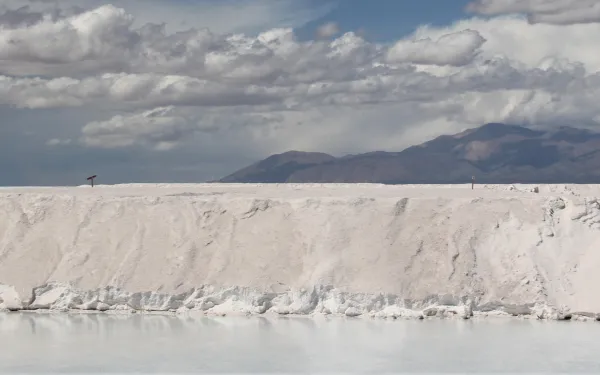
Call for a paradigm shift in EU Raw Materials Policies from a Latin American perspective
The growing global demand for transition minerals—including lithium, copper, and nickel—driven by the current energy transition model, but also by the expansion of the digital economy, data infrastructure, and the military and aerospace industries, is causing irreversible ecological damage and violating fundamental human rights across the territories of the Global South. Latin America is the most biodiverse region on the planet and one of the richest regions in cultural diversity. It is home to numerous indigenous peoples who inhabit and safeguard these territories. At the same time, it contains significant mineral deposits, creating an intersection between the growing global interest in mineral extraction and fragile ecosystems and territories of traditional and indigenous communities, such as the Amazon and the Andean wetlands. This scenario exacerbates climate vulnerability and creates the conditions for the emergence of socio-environmental conflicts, compromising the ecological and cultural integrity of these territories. The push for scaling up extraction contradicts multilateral frameworks as well as climate and biodiversity commitments that the EU has subscribed to. This tendency bears the risk of reproducing the same patterns of global inequality and climate damage these policies claim to overcome. The Alliance for Andean Wetlands calls on the European Union to adopt measures for a paradigm shift towards Raw Materials Policies that do not perpetuate inequalities and harm people and ecosystems, by: 1. Ensuring full compliance with its binding international human rights obligations and maintaining its high standards of human rights and environmental due diligence. The current debates on deregulation raise concerns about the EU's seriousness in implementing human rights and environmental safeguards along minerals value chains and in global gateway projects. In this context, the EU should not support: (i) the weakening of the provisions of the Corporate Sustainability Due Diligence Directive (CSDDD), an essential lever for holding EU companies accountable for their activities within and outside the region; and (ii) the privatisation of the implementation of international human rights and environmental standards. All forms of corporate self-regulation, such as multi-stakeholder initiatives, industry schemes, or third-party audits, are insufficient to demonstrate compliance with these standards and may undermine states' and companies' obligations. In this regard, legal frameworks should be sufficient to guarantee that corporations are held liable throughout the supply chain of critical minerals according to EU directives. This is a particularly sensitive question as it also challenges the existing regional human rights system, represented by the Inter-American Court of Human Rights, which has produced valuable precedents and jurisprudence on the matter for the past 45 years. 2. Guaranteeing maximum transparency, access to information, and inclusive participation of affected communities and civil society in the Global South. Ensuring early and effective involvement of civil society and indigenous and local communities affected by strategic projects, strategic partnerships, global gateway, and other initiatives. This involves guaranteeing the right to self-determination; to free, prior, and informed consent (FPIC) of indigenous peoples, and the respect for their right to say ‘no’ (RTSN). Undermining the voices from local communities and civil society increases social, ecological, and operational risks, especially mining projects likely to entail cumulative or long-term environmental impacts, particularly those involving extraction methods with potentially significant adverse effects on water, such as direct lithium extraction (DLE) or evaporation techniques. In contrast, including them is not only ethical but also essential for a just transition, the long-term viability of projects, and for preventing companies from facing future legal liabilities. 3. Challenging the projections of transition raw materials demand and rapidly adopting policies to reduce the production and consumption of primary minerals in the EU. The EU should set binding, ambitious, and measurable targets on energy and material reduction, taking into account planetary boundaries. In addition, conducting a prior, comprehensive, and independent strategic assessment of minerals needs and of alternatives to their extraction is essential to uphold the principle of proportionality, achieve climate objectives through less harmful means, and avoid irreversible damage to communities and ecosystems. Moreover, the EU should also foster more comprehensive circular economy strategies that take into account local economies and the biophysical limits of the ecosystems. Download the document
Read more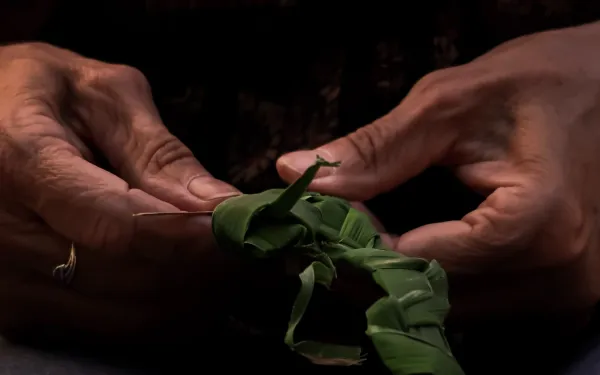
Climate Justice and Human Rights: Legal Standards and Tools from the Inter-American Court’s Advisory Opinion 32/25
On July 3, 2025, the Inter-American Court of Human Rights (IACtHR) delivered its Advisory Opinion OC-32/25 on Climate Emergency and Human Rights (Advisory Opinion), marking a historic legal and political milestone in the global fight for climate justice. It is the first advisory opinion issued by an international court to find that both States and non-State actors, such as business enterprises, have obligations rooted in international human rights law to address the causes and consequences of the climate emergency.The Court articulates clear and binding obligations to act urgently in protecting the global climate system, preventing human rights violations resulting from its alteration, and securing climate reparations. The Advisory Opinion will guide climate litigation in local, regional, and national courts, and provide a foundation for climate policymaking, grounding local legislation and global negotiations not in voluntary commitments, but in legal duties. It will also serve as a testament to the lived experiences and expertise of those on the frontlines of climate harm and at the forefront of climate justice, affirming the peril that climate change represents for human rights and the promise of human rights-based climate action and remedy.This Advisory Opinion is not an isolated development but rather part of an unprecedented global movement for climate justice. It stands alongside the recent climate advisory opinions of the International Tribunal for the Law of the Sea (ITLOS) and the International Court of Justice (ICJ), and may be joined by one from the African Court on Human and Peoples’ Rights (AfCHPR) in the near future. Together, these proceedings mark a decisive moment in consolidating a more comprehensive and human rights-based legal framework to confront the climate emergency— what the IACtHR deems an exceptional threat that endangers life on the planet and severely undermines the enjoyment of human rights. Moreover, these advisory opinions may help cut through the political inertia that has long stalled progress in international climate negotiations and national climate policymaking. This publication compiles fourteen thematic documents developed through the collaborative efforts of a coalition of environmental, human rights, and academic organizations, alongside experts who have actively participated in the advisory proceedings from the outset. The topics reflect the main thematic areas articulated by the Court in the Advisory Opinion and are organized into four sections: (i) Foundational Rights and Knowledge; (ii) State and Corporate Obligations; (iii) The Rights of Affected Peoples and Groups; and (iv) Environmental Democracy and Remedies.Each brief was prepared by a lead organization and subjected to rigorous peer review to ensure accuracy and consistency. Together, they provide an in-depth analysis of the Advisory Opinion’s key contributions, its legal and practical implications, and the gaps and opportunities this landmark decision presents across the selected thematic areas. They also present arguments, standards, and practical recommendations aimed at strengthening climate litigation and advocacy strategies.This series serves as a resource for legal and advocacy networks, enhancing understanding of the scope of the Court’s decision and encouraging legal and political action to advance the structural changes necessary for communities and ecosystems to achieve climate justice.Read and download the publication
Read more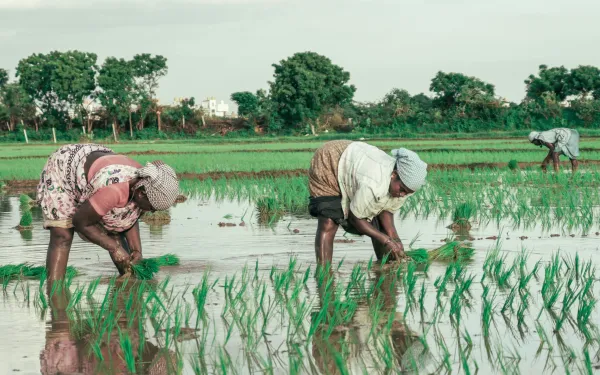
Small investments with great impacts. Territorial gender-just climate solutions
Since 2016, the Global Alliance for Green and Gender Action (GAGGA), together with other actors, has promoted a series of initiatives to strengthen the inclusion of a gender perspective in climate finance, particularly within the projects and financial flows of the Green Climate Fund (GCF).The GCF is the first international climate finance fund to incorporate a gender perspective as a central pillar of its operations, becoming a key framework for advancing equity in the access, use, and allocation of climate resources globally.However, international climate finance that reaches countries is often disconnected from the actual needs of the local communities it is meant to benefit— especially women. This poses a critical issue that demands urgent attention— communities have the right to participate in decisions that directly affect them. At the same time, it misses the opportunity to incorporate local knowledge into solutions— knowledge that could make them more relevant and effective in addressing the climate crisis. In its special report on climate change and land, the Intergovernmental Panel on Climate Change (IPCC, 2022) highlights that incorporating women’s knowledge of land management helps mitigate degradation and supports the adoption of integrated adaptation and mitigation measures.Gender-responsive climate finance goes beyond allocating resources to women and promoting gender equality—it requires rethinking how financial and climate solutions are designed and implemented. This means acknowledging the diversity of women, removing barriers to resource access, defunding so-called ‘false solutions’, and supporting initiatives that tackle the structural causes of climate change.In Latin America and the Caribbean, many local climate solutions remain unknown to decision-makers. As a result, they struggle to receive support, be replicated, or serve as inspiration for other initiatives benefiting the same communities. This publication presents five case studies of successful, locally developed climate solutions with a focus on gender and climate justice. The goal is to strengthen collaboration between those responsible for providing and implementing GCF resources and civil society organizations.The case studies show the efficiency that can be achieved when resources are channeled directly to civil society organizations and communities. All the projects were carried out with budgets under USD 50,000 and made significant contributions to transforming the structural conditions that heighten the vulnerability of territories, women, and other marginalized groups in the face of the climate crisis. Read and download the publication
Read more
Reimagining the circular economy from territories of extraction. Proposals from Latin America
Among the various global commitments to address the current climate crisis, international governance bodies — such as the United Nations — have highlighted the need to double renewable energy production and expand electromobility to decarbonize the global energy mix, calling this process the "energy transition." However, this transition entails intensifying the extraction of minerals essential for developing these technologies. Each region of the world plays a distinct role in the supply chains of minerals used in decarbonization processes. Latin America has been identified as one of the regions with vast mineral reserves capable of fueling this transition. Yet, in this context of growing mining interest, there is a tendency to render invisible the populations who inhabit these territories, as well as the hydrogeological systems of local, regional, and global significance that exist there.Lithium is one of the minerals whose commercial demand has grown significantly in connection with progress toward energy decarbonization. It is in the Gran Atacama region — located in the border area of Argentina, Bolivia, and Chile — where the largest global reserves are found. Nevertheless, for lithium to become available, it must pass through a complex international supply chain, which includes mineral extraction, refining, production of battery electrodes, battery manufacturing, and, finally, the production of electric vehicles.This surge in mineral demand within complex global supply chains raises concerns for the region about the risk of reproducing a new cycle of extractivism, unless public policies are devised and implemented that effectively integrate environmental, social, and territorial development standards.The circular economy, closely linked to the energy transition, emerges as a key strategy to overcome the logic of the traditional linear economic model ("take–make–consume–dispose"). Its aim is to reduce pressure on territories and common goods by incorporating sustainability criteria into supply chains and promoting more rational management of extracted mineral resources.However, this vision of the circular economy — when applied to minerals for the energy transition — can also perpetuate extractivism, particularly in the Global South. Decarbonization options often require vast quantities of minerals for energy storage, extracted at the cost of high environmental and social impacts. This threatens the resilience of the ecosystems from which they are taken and poses risks to the populations that inhabit them.Given these limitations, a circular economy proposal — from the perspective of Latin American extraction zones and applied to transition minerals — should contribute to ensuring that changes in the energy mix toward technologies with lower greenhouse gas emissions (commonly referred to as the energy transition) are truly just throughout all stages of the process. This entails avoiding the creation, expansion, and/or deepening of sacrifice zones; ensuring environmental restoration; guaranteeing the protection of human rights; and securing reparation where rights have been violated. It also requires respecting biophysical boundaries and the resilience capacity of ecosystems. Read and download
Read more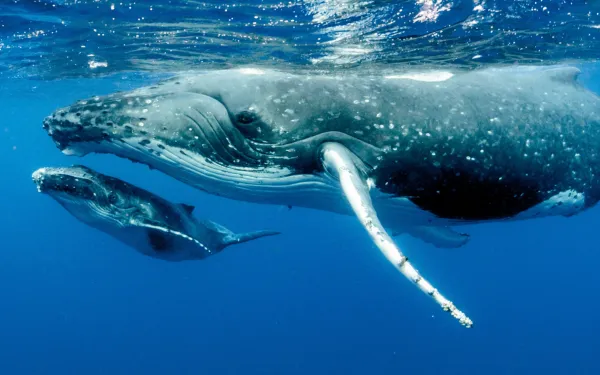
Cetaceans and salmon farming: Challenges for the conservation of marine biodiversity in Chilean Patagonia (executive summary)
In 2018, the environmental organizations Interamerican Association for Environmental Defense (AIDA), Greenpeace, and the NGO FIMA joined forces to confront the threat of the expansion of salmon farming in the southern waters of Chilean Patagonia. Since then, we have been actively working to expose and stop the impacts of intensive salmon production in pristine ecosystems, including special protected areas. In 2021, a scientific study of whale-ship interactions in Chilean Patagonia was published, including a video of a blue whale navigating a high-traffic area. According to the study, the world’s largest and most endangered mammal shares space with up to 870 vessels daily in Chilean Patagonia, one of its main feeding grounds. The study confirmed that 83% of the vessels were involved in the aquaculture industry.This finding shed light on a new facet of the environmental issues facing Chilean Patagonia, home to nearly 30% of the world’s cetacean species, including the endemic Chilean dolphin. This led us to commission a scientific report from a multidisciplinary team of experts to make the information publicly available. The results provided evidence of the impacts of salmon farming on cetaceans in Chilean Patagonia and highlighted the lack of studies and information needed to understand the magnitude and consequences of these impacts, as well as the true risk involved.In addition to complementing the efforts of civil society to demonstrate the urgency of halting the expansion of salmon farming in the country’s southern seas, we hope that this report will specifically draw attention to the real and potentially irreversible problem affecting these emblematic species. We also hope that the report’s recommendations will encourage the development of conservation measures for cetaceans, even in a context of insufficient knowledge, in accordance with the Precautionary Principle — recognized in the General Fisheries and Aquaculture Law, national legislation, and international law — which establishes the obligation to act in favor of environmental protection, even in the face of uncertainty. Finally, we hope that this report will motivate further research necessary to implement concrete and effective protective measures to make our waters a safe space for whales and dolphinsRead and download the executive summary
Read more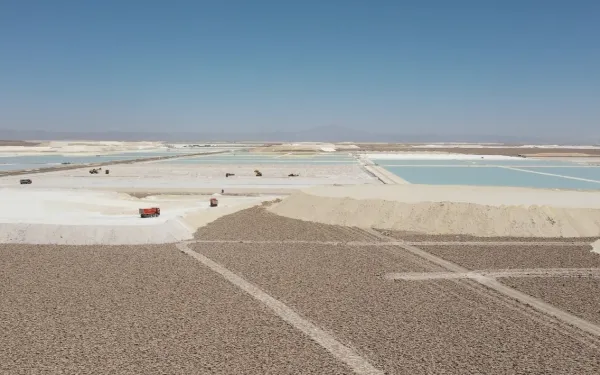
The role of critical minerals in the energy transition: policy implications at the local, national, regional and global level
2023 was the hottest year: 1.45 ºC above pre-industrial values. The trend points to an increase of 3º C. Consequently, climate events are becoming more extreme, frequent and long-lasting, affecting particularly vulnerable populations in the Global South. These countries not only lack financing to face losses and damages, and to propose mitigation and adaptation measures, but also bear the brunt of increased extraction of minerals needed for the energy transition in the Global North. The G20 countries, responsible for 76% of GHG emissions, should lead ambitious climate action, particularly in the energy sector, which accounts for 86% of global CO2 emissions (UNEP, 2023).In the outline of plans and policies for the energy transition, the demand for minerals considered critical, such as lithium, is increasing rapidly, exacerbating the global climate and ecological crisis by threatening Andean wetlands´ contribution to climate adaptation and mitigation. Also, this pressure to extract is affecting the rights of the indigenous communities who inhabit the salt flats in Argentina, Chile and Bolivia, which together concentrate over 50% of the world’s reserves. Additionally, geopolitical competition for technological control of the energy transition hinders countries in the region from advancing in the battery production value chain. Tensions emerge between technicaleconomic positions that prioritize the security of supply and friend-shoring and those that integrate the relationship between energy, ecological and socio-economic systems and challenge power asymmetries.This policy brief discusses lithium´s challenges for energy transition debates and calls the G-20 to ensure commitment to improved global cooperation that involves material reduction targets in the Global North, benefits for producer countries and a strong respect for planetary boundaries and human rights. Read and download the policy brief
Read more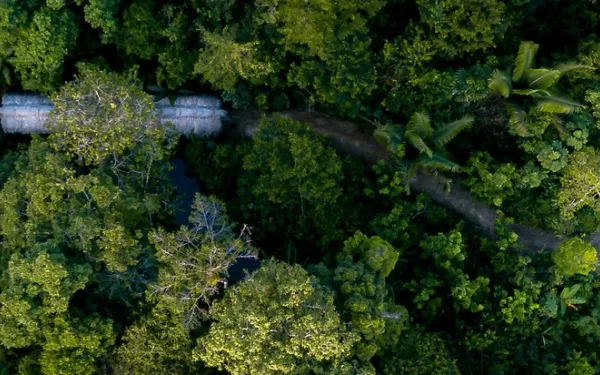
Closure and Responsible Exit
A requirement for environmental and climate justice in Latin America No natural resource (material or energy) extraction project lasts forever. Its useful life is subject to many variables, including endogenous factors -such as the amount of resource reserves or the extraction rate- and exogenous factors -such as decisions to address the climate crisis, the decrease in demand, financial problems, etc.- that condition the moment in which the project must close or the moment in which an actor in its value and supply chain must leave. Regardless of the length of the project's useful life or how it may be affected, a responsible closure process with the natural environment and society must be contemplated, which must be desired and promoted by all the stakeholders involved.This issue is even more relevant in the context of the climate crisis we are experiencing, which makes it urgent to implement measures to manage it in the short, medium and long term. Many of the actions required to meet greenhouse gas (GHG) mitigation targets are related to energy transition, which implies, in general terms, at least two things: 1) the substitution of fossil fuel extraction and use projects and 2) the promotion of low-emission renewable energies, which are associated with mineral extraction. In both scenarios, closure and exit issues are of great importance.In both extraction and generation projects, the role of their promoters, whether public or private, is essential. Likewise, the obligation of supervision and oversight of the States is very important for the protection and guarantee of the rights of those who may be affected. On occasions, the responsibility of the exit includes other key actors that are part of the value and supply chains of the projects: investors, insurers, distributors and buyers, among others.In Latin America, there have been important advances in regulating aspects related to the authorization, start-up and implementation of mining and energy projects. In these phases, environmental principles such as prevention and precaution, as well as rights such as prior consultation and free, prior and informed consent, and access rights, have played a crucial role in determining the viability and progress of projects, as well as in protecting and guaranteeing the rights of communities in the region. However, experience has shown that there are significant challenges for the closure and exit processes to be responsible with the ecosystems and communities involved. Indeed, the lack of a closure process, as well as the lack of clarity about the obligations surrounding the social transition processes and overcoming the conditions of economic dependence, are complex obstacles that can exacerbate environmental and social impacts. This report arises from the idea of proposing approaches based on law and science to address the closure and responsible exit of projects. To this end, we at the Interamerican Association for Environmental Defense (AIDA), in the period 2022-2024, interviewed various stakeholders1 and systematized 12 cases that exemplify the problematic situation of multiple fossil fuel extraction, mineral and power generation projects, which are in the closure phase or in exit processes in different countries of the region. These cases highlight the current challenges and legal, technical and administrative gaps regarding closure and exit in specific contexts.With this publication, we seek to provide answers to the following questions: what is meant by project closure and exit, what is the basis for closure and exit obligations under international law, what should closure and exit look like, who should be involved in these processes, and how should the social, environmental, economic and human rights challenges and impacts that arise from them be addressed? Read and download the report
Read more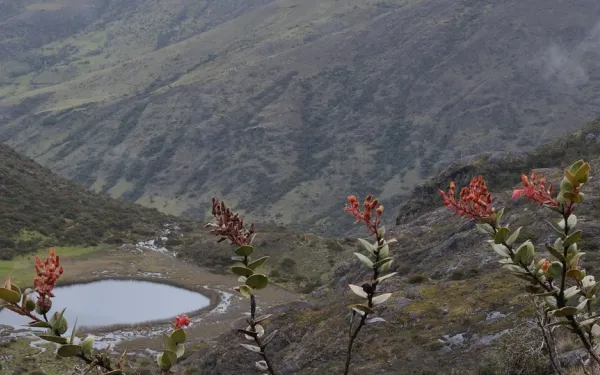
Declaration for the protection of the páramos and montane forests of the Tropical Andes
The undersigned civil society organizations, gathered in the framework of the 16th meeting of the Conference of the Parties (COP16) to the Convention on Biological Diversity (CBD) in Cali, Colombia: 1.URGE States Parties to the CBD to adopt domestic regulations and make international commitments to:recognize the crucial role of the páramos and the montane forest that protects them in global water regulation, mitigation and adaptation to the climate crisis, as well as in the conservation of biocultural diversity;protect the human rights, traditional knowledge and sustainable practices of indigenous peoples and peasant and traditional communities that inhabit the páramos and montane forest; andprohibit large-scale mining or similar practices in paramos and montane forests in terms of their socio-environmental impacts, in accordance with the principles of precaution and prevention. 2. REQUEST the States to include in their national biodiversity strategies and action plans indicators and monitoring mechanisms before the CBD that allow them to adequately measure and report compliance with the commitments they assume to advance in the conservation of these ecosystems under the terms of this declaration, as well as to guarantee the rights of the peoples and communities that inhabit them. 3. REQUIRE States and multilateral financial institutions to mobilize sufficient resources and technical capacities to guarantee the conservation of these ecosystems, as well as the protection of the indigenous peoples and peasant and traditional communities that inhabit them. We submit these requests to the States Parties to the CBD: Taking into account that there is a scientific consensus on the water regulatory power of the páramo and montane forest ecosystems[1] because they not only host endemic flora that captures freshwater from rain and fog, supplying it to the Andean cities located downstream; but also soils, lake and peatland systems that have a high concentration of organic matter and an enormous capacity to retain the liquid. In addition, the páramos wetlands are high Andean wetlands[2] under the protection of the Ramsar Convention on Wetlands of International Importance.Recognizing that páramos and their montane forests are fundamental in the carbon cycle; that due to low temperatures and the slow rate of decomposition of organic matter present in them, their soils, vegetation and wetlands capture and retain carbon dioxide (CO2)[3], contributing to climate change mitigation and adaptation and reducing the impact of meteorological events; and that these ecosystems are carbon sinks under the terms of the United Nations Framework Convention on Climate Change (UNFCCC).Reminding that, due to their biological and climatic characteristics, these ecosystems provide essential services for the population and contain biodiversity that is subject to special protection[4] and are home to endemic and native species of flora and fauna such as frailejones, pajonales, epiphytes, the chivito hummingbird, the Andean condor and the Andean bear, among others.Considering that the indigenous peoples and peasant and traditional communities of the region manage and protect the páramos and montane forests, ensure the preservation of common goods in their territories and are guardians of ancestral knowledge that is crucial for the conservation of biodiversity; that the integrity of the páramos is fundamental for the conservation of these ancestral practicess[5]; and that the páramos and montane forests are reserves of biocultural diversity within the framework of the CBD.Reiterating that the Intergovernmental Panel on Climate Change (IPCC)[6] warned of the impact of the climate crisis on páramos; and that they face other anthropogenic pressures such as fires, monocultures, livestock and invasive species[7].Warning that despite being strategic and sensitive ecosystems, deserving of the greatest protection, some of them are currently under strong pressure to develop large-scale mining projects, while others are at risk of being subject to mining concessions due to non-compliance with regulations and public policies that protect them or the lack of them.Bearing in mind that indigenous peoples and peasant and traditional communities have rejected these mining projects in their territories, even winning by majority vote "popular consultations" with which they have succeeded in defending the use of the land for traditional activities in their territories.Insisting that the removal of vegetation cover and the fragmentation of ecosystems generated by large-scale mining can affect the ecological balance, biocultural diversity and the provision of ecosystem services essential for life; acidify and reduce the amount of freshwater available for life systems; and break ecological and spiritual interconnectivity with other biomes and ecosystems, ending their capacity to capture carbon[8] and causing impacts in perpetuity.Following the warnings made by several UN rapporteurs and working groups on the negative impacts of mining on the environment and on human rights[9].Warning about certain dynamics recently employed by some mining companies in the countries of the region, particularly multinationals -such as the splitting of large mining titles, the change of exploitation method from surface to underground mining, as well as the formalization of small-scale miners in the area to outsource their activities by requesting multiple smaller areas-, which threaten to disguise large-scale mining processes with cumulative and synergistic environmental impacts on páramo ecosystems and montane forests that can be equal or more serious than those of a large-scale mining concession.Recalling that under the CBD States are required to: (i) monitor activities that have or are likely to have significant adverse effects on the conservation and sustainable use of biological diversity[10], such as mining; (ii) establish protected areas for biodiversity conservation[11] based on the traditional knowledge of indigenous peoples and peasant and traditional communities[12]; and (iii) adopt emergency measures when there are serious and imminent risks to biological diversity from natural or other events[13], such as risk from extractive activities. Signed byCentro Sociojurídico para la Defensa Territorial Siembra (Colombia)Colectivo Socio-Ambiental Juvenil de Cajamarca COSAJUCA (Colombia)Comité para la Defensa del Agua y el Páramo de Santurbán (Colombia)Consejo Territorial de Cabildos de la Sierra Nevada de Gonawindua CTC (Colombia)Corporación Ecológica y Cultural Penca de Sábila (Colombia)Movimiento Socioambiental Kumanday (Colombia)Natural Seeds Alliance (Colombia)Proyecto Dulcepamba (Ecuador)Acción Ecológica (Ecuador)Latinoamérica Sustentable (Ecuador)Unión de Defensores del Agua - UNAGUA (Ecuador)Federación de Organizaciones Indígenas y Campesinas del Azuay - FOA (Ecuador)Alianza de Organizaciones por los Derechos Humanos del Ecuador (Ecuador)Legal Defense Institute - IDL (Peru)Red Muqui (Perú)Red Internacional de Forestería Análoga - RIFA (Costa Rica)Mining Watch Canadá (Canada)Both ENDS (Netherlands)Redes del Agua Latinoamérica (Regional)Interamerican Association for Environmental Defense - AIDA (Regional)[1]Buytaert W. et al. Hidrología del páramo andino: propiedades, importancia y vulnerabilidad. Lovaina, U. de Lovaina, s.f.,, p. 10, 11, 23.[2] COP del Convenio de Ramsar, Resolución VIII.39. Los humedales altoandinos como sistemas estratégicos. Valencia, 2002.[3] Robert Hofstede et al. “Los páramos del Ecuador: Pasado, presente y futuro”, capítulo 12, págs 328 – 330, 2023[4] Robert Hofstede et al. págs 158 – 163, 2023.[5] IPBES (2018). The IPBES Regional Assessment Report on Biodiversity and Ecosystem Services for the Americas. Recuperado de: https://www.ipbes.net/assessment-reports/americas[6] IPCC (2013). Panel Intergubernamental de Cambio Climático, Quinto Informe de Evaluación, Recuperado de: http://www.ipcc.ch/home_languages_main_spanish.shtml[7] Ochoa-Tocachi et al., 2016, Tomado de IPBES (2018).[8] Madriñán, S., Cortés, A. J., & Richardson, J. E. (2013). Páramo is the world's fastest evolving and coolest biodiversity hotspot. Frontiers in genetics, 192.[9] Asamble General de la ONU, (i) Relatoría Especial sobre derechos humanos y sustancias y desechos peligrosos. Asamblea General de la ONU. A/HRC/51/35, 8 de julio de 2022, (ii) Relatoría Especial sobre el derecho humano a un medio ambiente limpio, saludable y sostenible. A/79/270, 2 de agosto de 2024, (iii) Grupo de Trabajo sobre la cuestión de los derechos humanos y las empresas transnacionales. Asamblea General de la ONU. A/78/155, 11 de julio de 2023.[10] Convenio sobre la Diversidad Biológica, Art. 7.C.[11] Ibid. Art. 8.C. CDB.[12] Ibid. Art. 8.J CDB.[13] Ibid. Art. 14.E. CDB.
Read more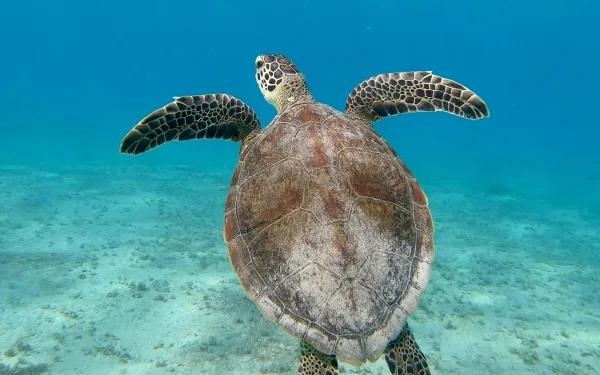
To defend the ocean's biodiversity is to defend human well-being
Statement by civil society organizations at COP16 of the Convention on Biological Diversity (CBD) The ocean is one of the world's main reserves of biodiversity, as well as a source of food, renewable energy and our main ally in combating the global climate crisis. Human populations, in addition to having their livelihoods in the ocean, maintain cultural connections around the ocean that define their past, present and future. However, this immense source of life continues to suffer increasingly significant damage and impacts, while efforts to protect and restore it are not increasing at the same rate.The intrinsic connection between ocean and climate itself embraces the balance of the planet. On the one hand, the ocean regulates weather patterns and, on the other, its characteristics are seriously altered by the climate crisis. The main indicators of these changes are the increase in temperature and sea level, acidification, deoxygenation, modifications in ocean currents, and a greater intensity of hurricanes and meteorological events. This affects marine biodiversity, causing the loss of particularly vulnerable species and habitat fragmentation. Coral bleaching associated with changes in climate, for example, alters the dynamics of many other species that depend on them, generating consequences for tourism, fisheries, climate resilience and biodiversity, as well as socioeconomic and cultural impacts.Overfishing puts commercial target species and coastal-marine ecosystems in general at risk. Some of the fishing practices of greatest concern are the extraction of vulnerable or endangered species; the non-compliance with or non-existence of closed fishing areas, the demarcation of fishing zones, permitted sizes and volumes; as well as the abandonment of fishing gear, which contributes to the problem of marine debris and causes the death of many animals that are trapped in them. Intensive aquaculture, such as salmon farming, directly destroys the marine ecosystem through contamination due to the constant incorporation of nutrients and the high use of antibiotics, producing anoxia and harmful algae blooms.Marine pollution from land-based sources continues to be a major stress factor for the marine environment and poses particularly serious problems in developing countries, where integrated waste management is extremely deficient. This has resulted in the introduction of polluting substances and materials into the ocean (untreated sewage, solid waste, including plastics, and agricultural runoff), causing changes in the quality conditions of the water column and sediments, often fatal to marine biodiversity and affecting human health.Likewise, maritime sources of pollutants require particular attention, as the ocean is the main means of transporting goods globally. Maritime traffic involves the transport of substances harmful to the marine environment - such as hydrocarbons, toxic chemicals, sewage, ballast water, garbage, and other hazardous substances - that are discharged into the sea in routine operational tasks and in maritime incidents. Hydrocarbons pose a particularly complex problem because they are not only transported as cargo but are also used to propel ships, thus representing a latent risk scenario with impacts on air quality due to atmospheric emissions of carbon dioxide, nitrogen oxides, sulfur oxides and methane, mainly in ships that use liquefied natural gas (LNG) for propulsion. In addition, the negative impact on marine fauna of collisions with ships and underwater noise from various sources cannot be ruled out; these factors still lack sufficient and effective public policies and regulations.Additionally, oil spills in the marine environment cause suffocation and intoxication of marine species, bioaccumulation of harmful substances, and even the functional destruction of important habitats. These impacts in turn affect relevant social and economic activities - such as shipping, fishing, tourism, and port activities - as well as endangering the health and the right to a healthy environment of coastal communities. Spills from offshore oil and gas exploration and exploitation are not adequately controlled and regulated by governments, being authorized activities in the vicinity of vulnerable areas such as coral reefs. These operations face serious limitations to prevent and provide timely response to spills with mitigation, restoration, and compensation actions for the damage caused. Environmental impacts from related activities, such as seismic exploration, dismantling of underwater infrastructures and platforms, and associated maritime traffic, are rarely evaluated.Finally, although there are no exploitation efforts yet, underwater mining poses risks that are impossible to assess in their magnitude, including habitat destruction, which could be irreversible, and species extinction. This is especially worrisome considering how little is known about the ecological and physicochemical dynamics in deep-sea and deep-sea ecosystems. The development of these intrusive activities - without having the technical and scientific base information that would allow us to objectively identify the potential impacts, as well as the possibility or not of preventing, mitigating or restoring damages - would doubtless cause the alteration of a highly sensitive and complex ecosystem.In consideration of the above - in our role as civil society organizations working for the protection and sustainable use of the ocean and for the defense of the right to a clean, healthy and sustainable environment - WE URGENTLY CALL ON THE STATES PARTY TO THE CONVENTION ON BIOLOGICAL DIVERSITY TO: Incorporate the ecosystem approach - which notes the interdependence between the atmosphere, land, and ocean - into their national biodiversity policies, strategies, and action plans, considering the provisions set forth in the Advisory Opinion of the International Tribunal on the Law of the Sea, which notes that anthropogenic greenhouse gas (GHG) emissions meet the definition of marine pollution under the UN Convention on the Law of the Sea. Use environmental impact and cumulative impact assessment tools to promote transparency and citizen participation with a gender focus and with emphasis on the consultation and consent processes of groups in vulnerable situations, such as indigenous peoples and local communities, so that the traditional and cultural knowledge that comes from the territories is included and valued to promote the implementation of projects and human development activities in a responsible and fair manner, weighing the right to a clean, healthy and sustainable environment over short-term economic benefits. Sign, ratify, and commit to the effective implementation of the Regional Agreement on Access to Information, Public Participation, and Access to Justice in Environmental Matters in Latin America and the Caribbean (Escazú Agreement) for these rights, and establish mechanisms for transparency and accountability in any environmental proceedings. Apply the precautionary principle in the absence of certainty or scientific information and recognize technical knowledge, science, and local wisdom as the basis for decision-making processes focused on the protection of the environment and biodiversity. Sign, ratify, and commit to the effective implementation of the Agreement on the Conservation and Sustainable Use of Biodiversity beyond National Jurisdiction (BBNJ Agreement), an instrument that will make it possible to advance in the protection of at least 2/3 of our planet. This will allow for: the equitable sharing of benefits derived from the use of marine genetic resources; the use of area-based management mechanisms, including the designation of marine protected areas; the development of environmental impact assessments prior to offshore activities; as well as capacity building and the transfer of marine technology for the benefit of the ocean. Continue to apply moratoriums on underwater mining activities based on the lack of sufficient technical and scientific information to foresee, prevent, control, and mitigate the potential impacts on the biological diversity of unknown ecosystems in deep waters and on the seabed. Sign, ratify, and commit to the effective implementation of the Agreement on Port State Measures (MERP Agreement) - to prevent, deter, and eliminate illegal, unreported, and unregulated fishing - as well as the Agreement on Fisheries Subsidies, to promote fishing practices that recognize the relevance of ocean sustainability. Strengthen and harmonize regulations on fishing and aquaculture, also advancing in their correct control, with the objective of ensuring the sustainability of these activities; avoiding illegal, unreported, and unregulated fishing; minimizing negative impacts on marine ecosystems and vulnerable species. Implement the Guidelines for Achieving Sustainability in Small-scale Fisheries in the Context of Food Security and Poverty Eradication (SSF Guidelines) in order to: recognize the contribution to the fishing economy of men and women working in all activities of the fisheries value chain; guarantee food security and the right to food; contribute to the development of communities engaged in this type of fishing; achieve sustainability of fishery resources; as well as promote culture and ancestral and traditional knowledge around fishing. Advance quickly and effectively in the process of negotiating a legally binding instrument on plastic pollution through the application of the circular economy model and responsible management throughout the entire cycle of these products. Plan mitigation and adaptation actions in the short-- and medium-term to address the effects of the climate crisis on the ocean and protect its carbon sinks through strategies and policies that contemplate the just and equitable energy transition in ocean-dependent sectors, in addition to the conservation and restoration of key ecosystems such as mangrove forests, seagrasses and coral reefs with a holistic and socio-ecological approach. The obligation of States Parties to the United Nations Framework Convention on Climate Change (UNFCCC) to submit updated Nationally Determined Contributions (NDCs) by 2025 is an opportunity to include, as climate commitments, measures aimed at mitigating impacts on the ocean and their restoration. These measures should not be limited to the creation of carbon markets in the ocean, but rather ensure the comprehensive protection of marine and coastal ecosystems, especially considering their fundamental role in climate regulation. Sign, ratify, and commit to the effective implementation of the Convention for the Protection and Development of the Marine Environment of the Wider Caribbean Region (Cartagena Convention); prioritize the creation and application of national regulations on standards and permitted thresholds for the discharge of polluting substances into the sea, harmonized with international law, and based on follow-up and monitoring programs that respond to the dynamics of each country. Adopt relevant domestic measures to reduce anthropogenic pressures currently affecting coral reefs, slowing the processes that are causing their degradation and allowing coral cover to be maintained at minimum levels that guarantee their permanence and connectivity. These measures include: Regulating environmental impact studies and management plans for offshore hydrocarbon extractive and prospective activities and other activities carried out near coral reefs and areas sensitive to coral bleaching.Avoid authorizing offshore hydrocarbon exploration and exploitation activities near coral reefs.Regulate the transit of ships near marine protected areas and particularly sensitive marine zones in terms of ballast water pollution and other polluting technologies for the marine environment that may affect the state of coral reefs. This will also reduce the possibility of accidents and groundings. Guarantee the rights and meet the needs of coastal and island communities that live from fishing - especially artisanal fishing - and local tourism that are being affected by the climate crisis and environmental problems, seeking to protect them from the degradation of marine-coastal biodiversity. Increase governmental efforts to create and implement programs and activities for capacity building and transfer of marine technology to reduce the gaps between developing and developed countries. This will enable ocean protection to be embraced globally as a pathway to climate and environmental justice. Guarantee the financing of policies, programs, plans, studies, and regulations, ensuring the necessary budgetary allocations to safeguard and manage coastal-marine ecosystems. To this end, they should target the use of all available means within countries, as well as international climate finance funds, cooperation projects and multilateral instruments dedicated to addressing the climate crisis and the mechanisms that have been agreed upon in the framework of the UNFCCC and the Paris Agreement, including the Green Climate Fund (GCF), as well as available resources from the private sector. Similarly, blue finance mechanisms that benefit vulnerable groups and have a positive impact on ocean health should be prioritized. Effective protection of our ocean is not possible without the commitment of the States Parties to the Convention on Biological Diversity. We therefore call for action and the definition of urgent national and international interventions to strengthen ocean governance.The risks of ignoring the accelerating impacts are too great. It is time to prioritize the health of the ocean and with it our own health. Signatory organizations:Interamerican Association for Environmental Defense (AIDA).Mexican Center for Environmental Law (CEMDA)Center for Marine JusticeMesoamerican Reef Fund (MAR Fund)Cethus FoundationMarViva FoundationHealthy Reef Initiative (HRI)Coral Reef AllianceFoundation for Eco-development and Conservation (FUNDAECO)High Seas Alliance (HSA)
Read more